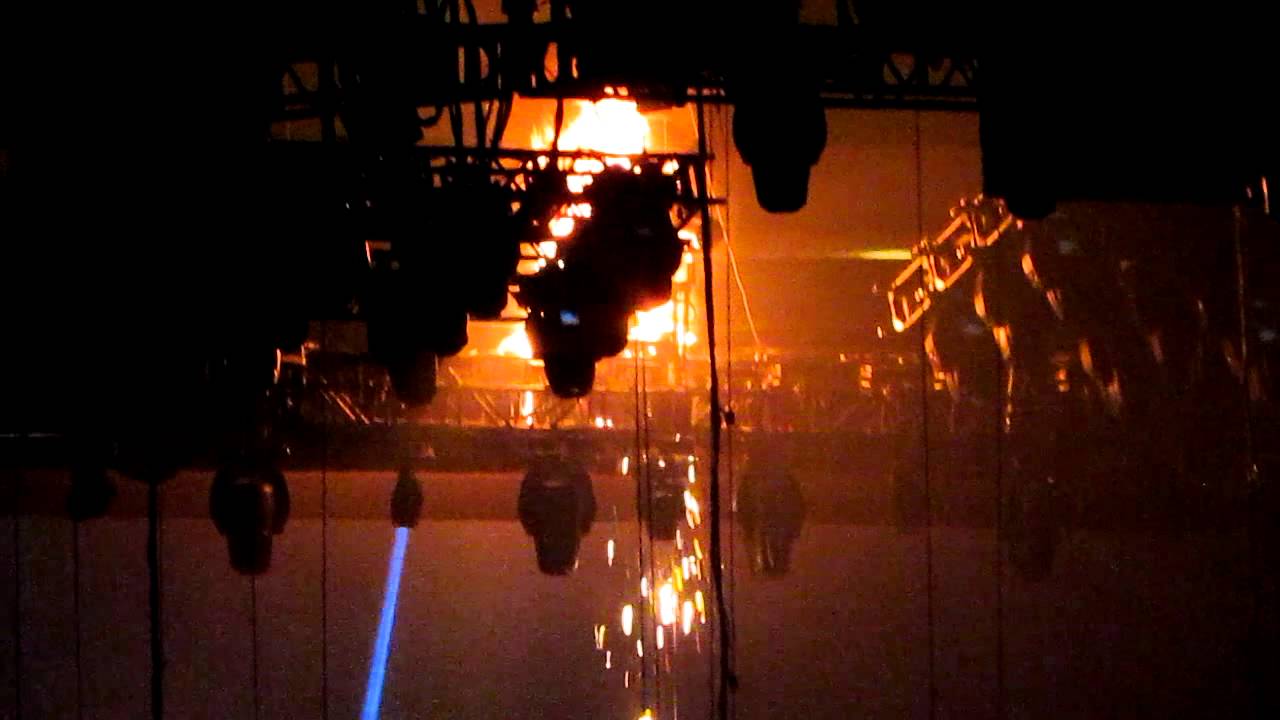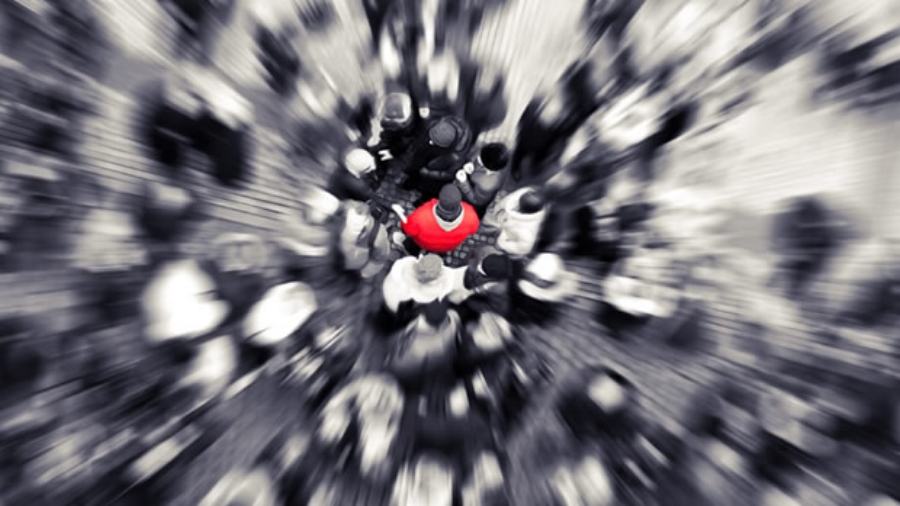HOW TO PREVENT & COPE WITH ANXIETY AT YOUR FESTIVAL GIG
MONDAY // APRIL 9, 2018
It’s officially festival season. Whether you’re the musician, performer, venue employee, volunteer, security, driver, touring crew, camping operations, tech crew, stagehand, ticketing operations, etc...working at a days-long music festival can throw serious curve balls at your mental health.
Behind-the-scene areas can be just as chaotic as the elements posed to the general public. You’re constantly just trying to do your job, but sometimes the music festival environment can throw you off balance.
Factors include but are not limited to a lack of sleep, working overtime, sensory overload, dehydration, high-stress environment, skipping meals and much more.
More recently than before, an increasing number of countries are finally beginning to put mental health on the same level of importance as physical wellbeing. In an industry already mentally and physically demanding, paying attention to your own wellness often comes second, if not last.
In the days leading up to and during your festival gig, feelings of anxiety are highly common. In fact, anxiety disorders are one of the most common mental illnesses in the United States, with approximately 40 million people affected, according to the National Institute of Mental Health (NIMH).
Each individual is widely unique from the next, so each formula will differ in regards to what works and what does not.
That being said, here is our round-up of tips and tricks you may consider to prevent anxiety, to combat anxiety or what to do if you experience a full-blown panic attack during your festival gig.
Prevention: Prepare for the days ahead
You know you’ll be working at Coachella in a few days, so now is the time to prepare yourself both physically and mentally.
It’s kind of like preparing for a marathon minus actually being in the marathon. Physically prepare yourself by feeding your body the right nutrients it needs and getting enough sleep during the nights leading up to the festival.
Your friends and family may have the common misconception about you working behind the scenes of a music festival - meaning, you’ll receive lavish treatment alongside festival acts they dream to see in concert. Sorry to disappoint your loved ones, you remind them the only person there to take care of you is YOU. And besides, most of the festival acts have their own trailers or spaces separate from the backstage crew.
Long story short, you need to be responsible for keeping your physical health in check. Particular circumstances may call for you to stand for longer than normal periods of time, remain in crowded areas (yes, even backstage, especially before/during performances of bigger artists), spend lots of time away from air conditioned rooms or resort to a meal you wouldn’t normally opt for.
If you prepare with lots of sleep and nutritious meals, your body will react stronger to unforeseen situations at the festival. Lack of sleep contributes to both stress and anxiety, so going into the festival with your energy tank full is highly recommended.
Like we’ve said in previous blog posts, the more stressed you are, the less likely you are to sleep and having a bad night’s sleep prior to working at the festival will contribute further to that stress and cause anxiety.
And again, too much caffeine intake and/or smoking cigarettes to combat sleep deprivation and stress, respectively, are both recipes for anxiety.
If you’ve never been to the venue, try and familiarize yourself with it through maps, research or even a Google maps image of the outside. It may seem like the obvious thing to do, but double or triple checking may ease your nerves.
Also noting the locations to exits, entrances, emergency exits and medical tents is both helpful and comforting. Apply this same knowledge to both general public areas and backstage.
Prior to the festival, try to tell yourself and expect that you cannot control everything. Roll with the punches and do your best. If you are doing the absolute best job you can do in your control then you’ll have to settle for it - and be proud!
Feeling Anxious
Of course, there is a big difference between feeling anxious and suffering from an anxiety disorder. Regardless, when facing these feelings, it may be safe to say the individual is experiencing behavioral anxiety, a response to frightening or stressful situations, Life Hacker reported.
There are many theories pertaining to the origin of anxiety and many forms of anxiety disorders. Whether you are one or the other, repetitive feelings of anxiety, strong or mild can have a negative impact on your state of mind during the big event.
Despite all attempts at prevention, you begin to tense up, have an overwhelming sense of awareness of all your surroundings and feel fearful and/or dreadful. This is the definition of anxiety.
But how do you know if you are experiencing a panic attack? Outlined by Anxiety BC, there are 4 Facts you should know about panic attacks:
- Panic attacks are simply the body’s fight/flight/freeze response even when there is no real danger present. A physical response may include an increased heart rate.
- Although scary and/or uncomfortable, panic attacks are harmless. They are compared to an alarm system within your body, but not designed to cause real harm.
- Panic attacks only last about 5-10 minutes, although they may feel as if they last an eternity.
- Many times, most people won’t be able to see you experiencing one. Those closest to you will, but for the most part they are internal experiences.
Outlined by the Anxiety And Depression Association of America (ADAA), here are some strategies you can use to decrease the intensity of a panic attack. Anxiety BC urges one to use these techniques NOT to stop a panic attack, but to help you ride it out until it’s over.
- Take deep breaths; concentrate on inhaling and exhaling slowly through your nose. Not just in the event of a panic attack, but also throughout the day while feeling stressed.
- Don’t use breathing to stop a panic attack, because it’ll only make it worse. Instead, use breathing techniques to lessen the intensity, Anxiety BC reported.
- Slowly count to 10 or 20 if necessary
Taking a time out not be possible with your role at the festival, but in any moment you have a team member who can take your place for a small window of 5-10 minutes, getting some fresh air away from the chaos in a comfortable area works wonders.
- In preparation to the festival, stowing some headphones in your pocket for this situation also helps remove yourself mentally from the chaotic scene
- Learn some relaxation techniques such as meditation - meditation during a festival, yeah right. This is where headphones and a space to close your eyes for a brief moment can really help.
- If possible, try some of these Muscle Relaxation techniques. This is more effective if you start practicing these in times not suffering from a panic attack. So in the event you experience one, this technique will be a piece of cake.
Adopt Realistic Thinking
According to Anxiety BC, what occurs in the mind during a panic attack can be categorized as overestimating or catastrophizing.
- Overestimating: Picturing the worst outcome (that most likely will not happen) is going to happen, such as having a heart attack due to your panic attack
- Fight back: These thoughts are NOT facts. You are mistaking a possibility for a probability. Ask yourself how likely this outcome actually is.
- Catastrophizing: Thinking the worst thing will happen and you won’t be able to deal with it, such as fainting from a panic attack and having others laugh and judge you
- Fight back: Ask yourself what’s the worst that can happen when coping with the negative situation. Would it really make a difference in the duration of a year?
These are just some of the tools one can use to combat a panic attack. Many more involve steps to take at home, away from the festival scene, that will overall help you when you are challenged with a panic attack on the job.
To read more in detail about panic attacks and management strategies you can take during the attack, before and after click here.
Finally, when the festival is all said and done, it is crucial to take at least one day off to regroup. Your hard work, long hours, lack of sleep and/or nutrition probably derailed from its normal, healthy path so it is important to give your body and mind the rest it needs and deserves.
Really try to put down the phone and refrain from checking every single email the day after the festival. Those follow-up emails and thank-yous can very well wait 24 hours.
When you do return to work, this could be the perfect time to open up to your team about how you’re feeling.
If you feel stressed and overwhelmed, chances are your team members feel the same way and a support system is formed.
This could also be a time to speak with teammates and supervisors about what went well and what did not.
Evaluate the situations that caused the most stress by writing them down, discussing them and making a lasting change for future festivals and events.
In turn, encourage your team to open up by asking how they are really feeling and offering a helping hand. According to Conference & Incentive Travel that ranked events industry professionals No.5 on the most stressful jobs, a staggering 38% of individuals do not want to ask for help.
Reassuring your teammates they’re not alone could very well change this percentage and the stigma associated with mental health in our industry.







![© [@leekris] / Adobe Stock](https://images.squarespace-cdn.com/content/v1/53ff6ee6e4b02adad6b9e8aa/1502391799929-NJ0N5I1UAXH89QKHO96P/image-asset.jpeg)








